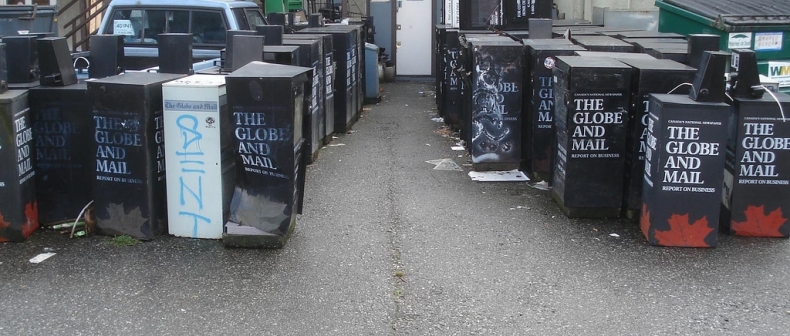
The Globe is on a precipice, and it better step back.
Its most prominent columnist, a woman who used to be the paper’s managing editor and is as much a part of the fabric of the The Globe and Mail, old and new, as anyone in that white-bricked building, has been accused of a serious, habitual breach of journalistic ethics; plagiarism, among other things (the latest evidence was posted yesterday). Documentation was provided, not just for the three-year-old column that’s been getting all the recent attention, but for several more over a period of years, pointing not to understandable lapses but to habitual laziness (if we’re being kind) or malfeasance (if we’re not).
And what was the Globe‘s response? First, from their public editor, Sylvia Stead, another woman of decades’ standing at 444 Front West (coming up on four, to be precise), derisive references to the anonymity of the source of the repeated and well documented accusations, which she did not quote, and a defense of her long-time co-worker and former boss, in Wente’s own words, which took up more than 20 per cent of the piece which was, remember, the paper’s official and only response. Anonymous, unquoted accusations versus a name-brand 97-word defence: She may as well have run the piece under the headline, “Nothing to see here. Move along.”
But in her second paragraph, tucked between phrase meant to mitigate its impact, “there appears to be some truth to the concerns”.
Since those “concerns” were that a national paper’s flagship columnist was blurring the difference between her thoughts and others’ with the effect of pumping up her own appearance of authority and depth of understanding, the next sentence should have been, “We have put Ms Wente on temporary unpaid leave until we have resolved the issue.”
The actual next sentence, however, was “It is very difficult to be more definitive because we are talking about a column written three years and two months ago.”
As if that mattered. The subtext there is that it was so long ago, the writer herself did not remember the circumstances surrounding it. But the writer herself, accused of wrongdoing, should not be the main source of context or information. Once an investigation is done — and newspapers often have people who are quite good at investigating — then the writer can be confronted with whatever evidence there may be, and can provide whatever defence she may have.
People were not happy with public editor Stead’s response. So editor-in-chief John Stackhouse stepped in. He was more direct, as he presumably realized by this time he had to be, stating outright that the one column in question was “not in accordance with our code of conduct and is unacceptable.”
Once again, the next sentence should have been, “We have put Ms Wente on temporary unpaid leave until we have resolved the issue.” Once again, it was not. This time, it was “As in all disciplinary cases at The Globe, the details remain a private matter between employer and employee.”
If another editor, say, Wente’s editor, or perhaps the public editor, had caught these potential problems, taken them to her, been unsatisfied by Wente’s explanation, then, perhaps, a case could be made for it to “remain a private matter between employer and employee.” But this was not between an employer and an employee. It was between that anonymous blogger, Ottawa artist Carol Wainio, and Wente and the Globe and its readership and the rest of the journalistic community, which was by this time incensed by how all this was being handled.
We should know what that discipline consists of and be able to decide whether the punishment fits the gravity of the accusation, so we as readers can judge whether we would like to continue to put our faith in this newspaper.
But there would be even more hedging.
Realizing that all this bother was not going away quite yet, public editor Stead wrote another response in the form of a bullet list of things she and the paper would do to prevent this sort of thing from happening again. The purpose of such a piece is, one expects, to restore some of that faith among those who are not so sure what’s happening over there, not just because of what Wente may or may not have done, intentionally or unintentionally, lazily or maliciously, but because of how seriously the paper seems to take itself and its readers.
Here’s what Stead said about her own role in the affair thus far:
“I erred in not being more forthright in saying that the work in this complaint was unacceptable and failed to meet Globe and Mail standards. It was not acceptable. In my haste to respond, my earlier blog post was not well considered. I didn’t have all the information I required to make a proper assessment last week and should have taken more time and probed more. For one thing, Ms. Wente said she did not recall reading a piece by the Ottawa Citizen‘s Dan Gardner or the other sources before writing the column. She now says she did read Mr. Gardner’s article. Had I known that information at the time, I would have been much stronger in pointing out serious problems.”
She erred, she says, in not being more forthright. Nonsense. She was very forthright. She was explicit, both in what she said and what she failed to say, that she did not think there was a failure to meet Globe and Mail standards.
She blames her haste. Once again, if we were to be kind, we might call this disingenuous. Haste produces typos, not supercilliousness. She says she didn’t have all the information when she first responded. She had enough, and record of more through previous complaints by Wainio and published corrections of similar matter in the past, to know that this was serious, whatever an investigation ultimately turned up.
Her final bit of worrying sophistry is her statement that she would have been “much stronger in pointing out serious problems” had she known, as she now does, that Wente did remember reading Gardner’s article. Once again, she is relying on her chat with Wente. If Wente says she doesn’t remember, no harm no foul. Once she says she does remember, well, that’s serious. To reiterate: Wente is the accused here, and what she is accused of is dishonesty. Her word is not what the paper should be basing their sense of the situation on.
She then goes on to say, “I should have referred to the blogger’s complaints, not the anonymous blogger.” The way she phrases it, she makes it sound like an unfortunate, and possibly hasty, choice of words, when it was nothing less than an intentional and apparently instinctive attempt to undermine the credibility of the complaint.
I don’t know what her next line should have been, but it could not have been any more pat-on-the-head condescending than what it was: “Our readers are very smart”.
I said the Globe is on a precipice. All of us in print journalism are. We are blessed in this city with several serious, and seriously good papers (the Globe most certainly included) with distinct but not antagonistic points of view, but we have not figured out how to make money online, and the physical papers are selling in smaller and smaller numbers. As managers cut staff and increase the role of lifestyle sections that self-consciously serious papers like the Globe would have been called advertorial in a not-so-distant era, the one big and possibly industry-saving thing they have left is their credibility.
Who knows whether Jezebel or Buzzfeed get things right, whether they check their facts and sources, correct their errors or know enough about the subject to provide the sort of context necessary to make it comprehensible. And who cares? One link leads to another leads to another, and we’re often not even aware whether that bit about Kristen Stewart moving back in with Robert Pattinson came from Gawker, Vulture or the Daily Beast. Will any of these sites be around in five years? In two? The Huffington Post, which is emerging as the most redoubtable of this generation of online journalism, has been around for just over seven years. The Globe‘s been around for exactly 24 times that long. You can’t buy that kind of credibility, no matter how many former employees of credible organizations you hire.
There are many things newspapers and their owners figure they can no longer afford: foreign bureaus, proofreaders, journalists over the age of 50. But the one thing that they absolutely must spend their last dollar on if they are to survive the present global media tumult is the faith their readers have that what they print is right and honest. If they lose that, they lose everything.
I think that’s worth a few weeks’ unpaid leave, don’t you?
____
Bert Archer writes for Toronto Standard. Follow him on Twitter: @bertarcher.
For more, follow us on Twitter: @TorontoStandard, or subscribe to our newsletter.














